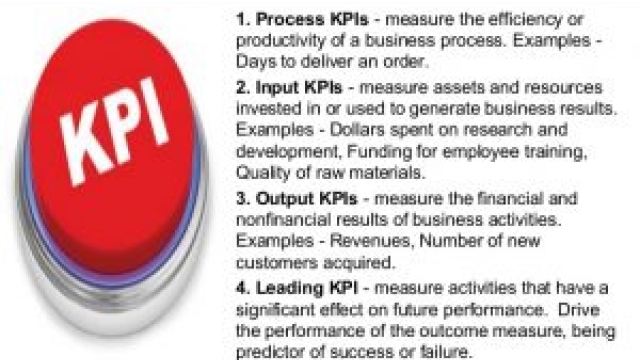KPIs: Unlocking their Full Potential
Unlocking the full potential of Key Performance Indicators (KPIs) is an essential step towards driving business success. In today’s competitive landscape, refining KPIs has become a crucial task for organizations of all sizes. These performance metrics serve as powerful tools to evaluate progress, make informed decisions, and steer towards strategic goals. However, understanding how to effectively refine and utilize KPIs is key to unlocking their true value. In this article, we will explore the significance of refining KPIs and delve into actionable strategies to optimize their impact on business performance. So, let’s embark on this journey of unraveling the immense potential of KPIs and discover how they can be fine-tuned to drive success.
Understanding the Purpose of KPIs
Key Performance Indicators (KPIs) are essential tools that organizations use to measure and evaluate their progress towards achieving their goals. By defining specific metrics that align with their objectives, businesses can gain valuable insights into their performance and make informed decisions. Refining KPIs is a crucial step in unlocking their full potential and maximizing their effectiveness.
When it comes to refining KPIs, it is essential to understand their purpose. KPIs should not be chosen arbitrarily or based on popular industry trends. Instead, they should directly relate to the objectives of the organization, providing meaningful and actionable information. By clearly defining what success looks like for each aspect of the business, KPIs can effectively guide decision-making processes.
A refined set of KPIs should be tailored to the individual needs of the organization. It is important to consider the unique challenges, goals, and characteristics of the business when selecting and defining KPIs. By focusing on the specific outcomes that matter the most, KPIs can provide a clear picture of progress and highlight areas that require attention or improvement.
In conclusion, refining KPIs is a vital step in leveraging their full potential. By understanding the purpose of KPIs and aligning them with the objectives of the organization, businesses can gain valuable insights and make informed decisions to drive success.
Defining and Measuring Effective KPIs
In order to harness the full potential of Key Performance Indicators (KPIs), it is crucial to have a clear understanding of what makes a KPI effective. By refining and fine-tuning KPIs, organizations can maximize their impact on business performance and drive sustainable growth. Let’s explore the key aspects of defining and measuring effective KPIs.

Clarity of Purpose: Effective KPIs must align with the organization’s objectives and provide clear insights into the progress towards those goals. It is important to define KPIs that are specific, measurable, achievable, relevant, and time-bound (SMART). By clearly outlining the purpose and desired outcomes of each KPI, organizations can ensure that they are focusing on the most critical aspects of their performance.
-
Data Accuracy and Availability: Accurate and reliable data is the foundation of effective KPI measurement. Organizations should invest in reliable data collection mechanisms and systems to ensure the quality and availability of the necessary data points. Without accurate data, KPIs lose their value and effectiveness in driving decision-making and guiding performance improvements.
-
Regular Evaluation and Adjustments: The effectiveness of KPIs should not be set in stone. Regular evaluation and adjustments are necessary to ensure that KPIs remain relevant and aligned with evolving business needs. By analyzing KPI performance periodically, organizations can identify areas for improvement, make necessary adjustments, and drive continuous growth.
By focusing on these core aspects of defining and measuring effective KPIs, organizations can unlock their full potential and seize the opportunities for driving success in today’s competitive business landscape. Refining KPIs allows organizations to stay agile, adapt to changing market dynamics, and make data-driven decisions that foster sustainable growth.
Leveraging KPIs for Business Improvement
KPIs are essential tools for measuring and monitoring the performance of various aspects within a business. By refining KPIs, organizations can unlock their full potential and drive significant improvements. Effective KPIs provide valuable insights that enable informed decision-making and help align business objectives with desired outcomes.
When refining KPIs, it is crucial to focus on the most relevant metrics that directly contribute to the overall success of the business. Identifying key indicators that align with strategic goals and drive desired behaviors can significantly enhance business performance. This process involves carefully analyzing data, understanding industry benchmarks, and considering the unique needs of the organization.
Once refined, KPIs can be leveraged to drive business improvement initiatives. By regularly measuring and tracking these indicators, organizations can identify areas of strength and areas that require immediate attention. This enables proactive decision-making, allowing businesses to make necessary adjustments in real-time and optimize their operations.
Furthermore, the insights gained from refined KPIs can facilitate effective resource allocation and goal setting. These metrics provide a quantitative basis for evaluating performance and allocating resources to areas that have the highest impact on achieving desired outcomes. By aligning resources with strategic priorities, businesses can maximize their efficiency and drive continuous improvement.
In conclusion, refining KPIs is crucial for unlocking their full potential and harnessing their power for business improvement. By carefully selecting and measuring relevant metrics, organizations can gain valuable insights, optimize operations, and drive performance towards desired goals. Leveraging KPIs effectively enables businesses to make informed decisions, allocate resources strategically, and ultimately achieve sustainable success.


